WeChat just released its most rigorous policy to date regulating incentived sharing and external links.
The policy banned some of the most common campaign tactics. Here are some of the highlights of some of the new bans:
- Group buy campaign are highly regulated
- Incentivized App downloads
- Editing or re-use of user’s profile pictures or user information
- Sharing a link that contains users’ profile picture and user name
- Providing a service that’s similar to WeChat features
While the purpose of the regulation is to improve end-user experience and protect user’s privacy, it could be a deadly trap for companies that are trying to acquire marketing leads.
Here are some of the biggest updates. The full regulation detail accessible via the link at the end of this article.
General incentivized sharing rules
These rules are not specific to the new regulation (they were already in place previously), but it is good to have a refresher on them as the new regulation suggests they might be enforced more strictly:
- It is forbidden to give any incentive to a user (including but not limited to red envelopes, coupons, vouchers, points, credits, data, content) in order for them to perform an action on WeChat (share, like, read, comment, etc.)
- It is forbidden to offer any incentive to a user (including but not limited to red envelopes, coupons, vouchers, points, credits, data, content) that they will have to claim outside of WeChat (in another App or website)
- It is forbidden to use any strong language when asking user to share content (“You’re not Chinese if you’re not sharing this”, “You must share this right now!”, etc.)
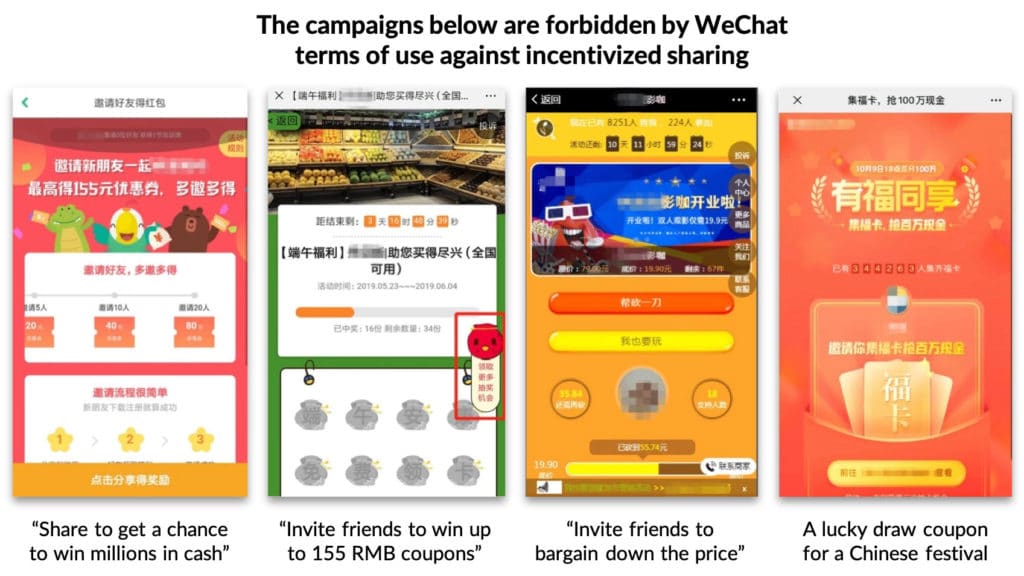
Group buying is heavily regulated
Group buys are a great way to spread your marketing messages to the direct contacts of your customers. Many merchants took it a step further, spreading false or misleading information to trick users into purchases.
This is now explicitly prohibited by WeChat:
- Fake group purchase events, where … the amount paid by some group participants is obviously not equivalent to other participants
- Group purchase events with lottery nature
- Group purchase events with no clear and definite rules, or the rules are not publicized to the users in a an obvious notice
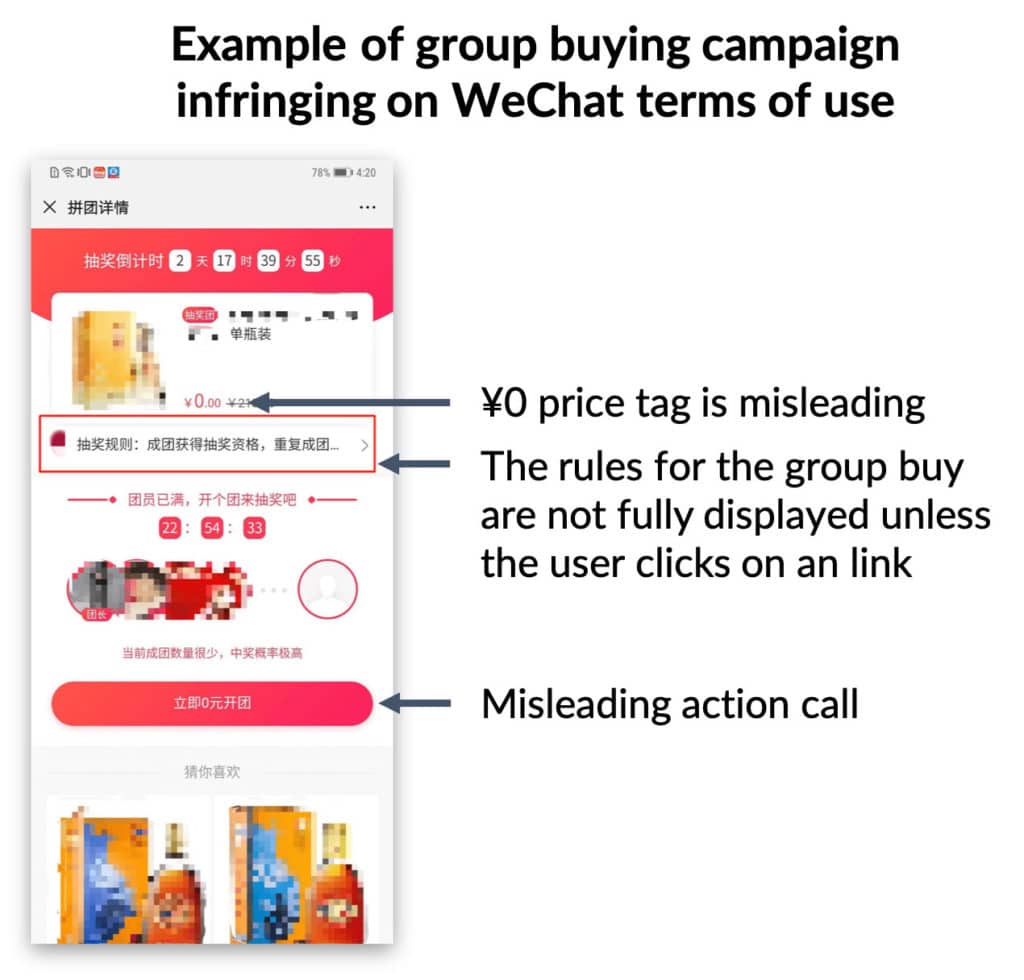
For example, the above group buy is considered to break the new term since the group-buy rule is not clearly displayed in a visible space. It also contains a lottery feature that could mislead users to make an unintended purchase.
Other information that needs to be clearly displayed includes whether the customers are able to receive a refund if the group buy deal did not meet the target.
Incentivized sharing 2.0
As we mentioned, WeChat has always been strict on incentivized sharing, meaning giving any kind of incentives (red packet, coupon, points, information…) to encourage users to share content. And the updated WeChat regulation takes the incentivized sharing ban to another level.
For example, the most common e-commerce practice of Pinduoduo “share to bargain” is now banned. Pinduoduo was able to grow its user base among the older users who live in lower-tier cities with the “share to bargain” campaign. Users can “bargain” down the price by asking friends on WeChat group to participate in the campaign.
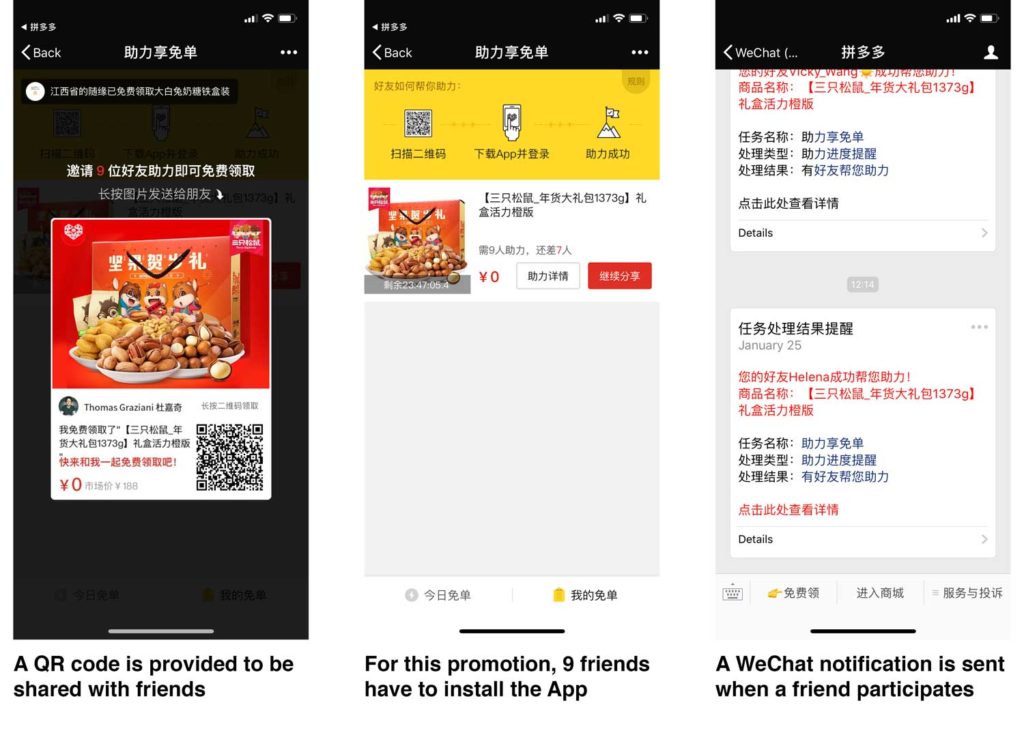
Another common campaign tactic that got banned is asking your friend to help you increase the chance of winning a prize. Ticketing companies have been using this strategy to get more users to register for membership or download Apps.
Download App to win a prize
Be careful about the content you put in the App download landing page. A common tagline such as:
- “Download the App to get XXX RMB red packet”
- “Invite a friend to receive XXX amount of coupon”
- “Get a data package of XXX if you download the App”
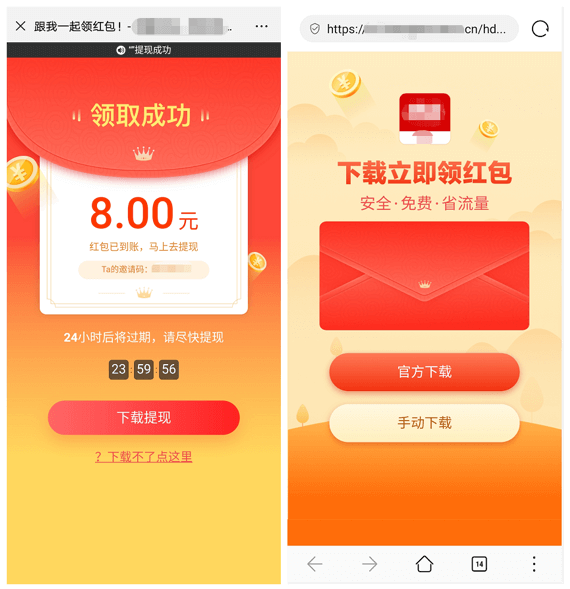
Privacy & data protection
Have you ever seen campaigns using the user’s profile picture as the thumbnail picture? This is banned as well!
Brands will not be able to use users’ profile picture or WeChat name in any kind of first-layer sharing preview to increase the click-through rate.
Brands will need to explicitly inform the user and acquire specific permission if they want to store or use any kind of user’ information, such as phone number, open ID, Chinese ID, date of birth and etc.

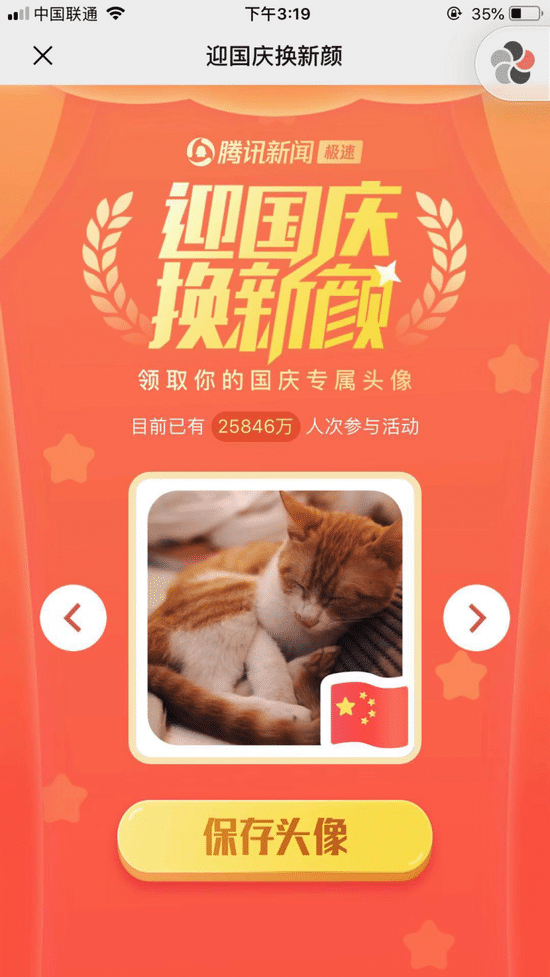
Above are 2 viral campaigns that added a filter/icon on user’ profile picture. Both campaigns were banned by WeChat. Previously Toutiao got itself into a lawsuit with Tencent by trying to re-map the user’s contact map and use the user’s profile picture. As WeChat sees user profile as an important asset, it’s not something any 3rd party can reuse.
Competition with WeChat
Any kind of feature build that competes with the existing features of WeChat is not allowed. A list of companies that were or still are blocked by WeChat includes Douyin, NetEase Music, Xiami Music, Alibaba…
WeChat is a perfect platform to promote physical products or traditional services. But it remains very defensive toward other applications that might attempt to steal its user base.
Effective date
The new regulation will take effect as early as Oct 28th, 2019.
What might be the punishment if you infringe on the above rules?
Potential sanctions for violating the WeChat terms of use include:
- Block the website or IP address
- Limit or block the traffic to content on WeChat Moments
- Partially or fully limit the features of the Official Account
- Temporarily block or event permanently delete the account
- Ban the company from using the WeChat system
Usually, WeChat will give the account a warning before completely block the account. But in case of a viral campaign, the harshest punishment could apply on the first strike.
As is often the case, WeChat has a relatively vague approach to infringement and punishment. This strategy forces companies to remain as far as possible from violating the rules (as it’s not clear where is the line that will get the punished)
Conclusion
The direction of WeChat is clear: anything that effect user experience on WeChat shall not be allowed. Content should only be shared if the user likes voluntarily want to do so.
Link to the original regulation (Chinese): http://weixin.qq.com/cgi-bin/readtemplate?t=weixin_external_links_content_management_specification
Here is the full translated version of the WeChat regulation:
WeChat external link content management specifications
Revised date: October 18, 2019
Effective date: October 28, 2019
In order to further optimize the experience of WeChat users and better protect the legitimate rights and interests of WeChat users, the management specifications relating to external links that are not generated by WeChat public platform (that is, domain name addresses are not attributed to WeChat public platform, hereinafter referred to as ” the external link “) and spread within WeChat are publicized.
For contents that violate these specifications, Tencent has the right to process them, including but not limited to stopping them from spreading information on WeChat, accessing the relevant domain name or IP address, preventing related links from opening directly, and making them invisible in the WeChat Moment, etc. If the contents are implemented or initiated by verified official account on WeChat Public Platform or verified account on WeChat Open Platform, the verified account and the related entity will also be punished according to WeChat rules, including but not limited to restricting or prohibiting the use of part or all functions, suspension or deleting the account, etc. In the worst cases, the account, domain name, IP address or sharing interface will be permanently banned, and the results will be made public. WeChat also has the right to refuse to provide services to the above entities in accordance with these regulations, related agreements and special rules.
These specifications are in-platform management measures to further enhance WeChat’s safe and healthy network ecosystem. The Platform does not assume additional legal obligations or legal responsibilities for the development of these specifications, nor does it constitute any commitment to process all the relevant contents.
The specific rules and related penalties are as follows:
1. Inducing to share the external link
1.1 Inducing users to share the external link to proceed to the next step, share to know the answer, etc.

1.2 Incentives to induce users to share and disseminate the external link content, including but not limited to monetary rewards, physical prizes, virtual prizes (including but not limited to red envelopes, coupons, vouchers, points, credits, traffic, information). Claiming that sharing the external link can increase the chance of winning, the probability of winning, the possibility of success. Induce users to share and disseminate the external link content through attendance check-in, inviting friends to assist (including but not limited to boosting, bargaining, acceleration), setting up collection tasks (including but not limited to collecting praise, cards, blessings and fragments), etc.
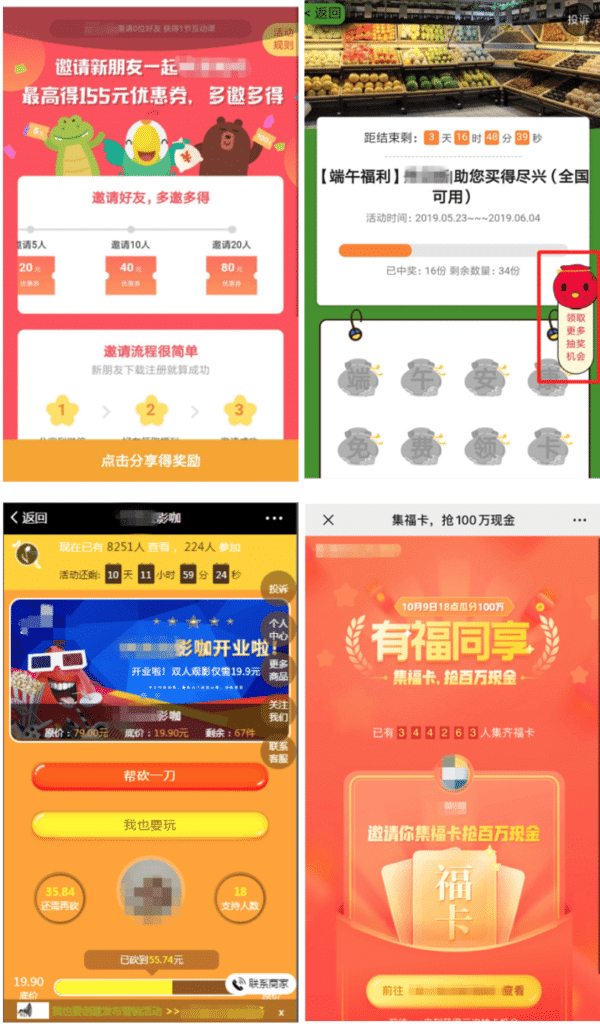
1.3 Use exaggerated words to coerce and lure users to share, including but not limited to “Share it if you’re Chinese”, “Please kindly share it”, “Share it and you’ll get a peaceful life”, “People are sharing this like crazy”, “Must share it”, “Share it to your WeChat Moment, all your friends will be grateful “, etc.
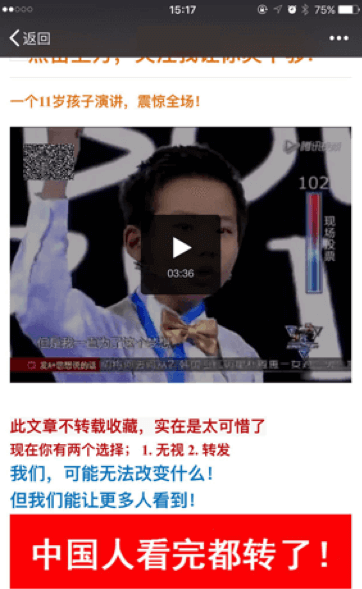
2. Inducing to follow the account
Forcing or inducing users to follow official account, including but not limited to checking the answer, receiving red envelopes, join the activities after following the accounts.
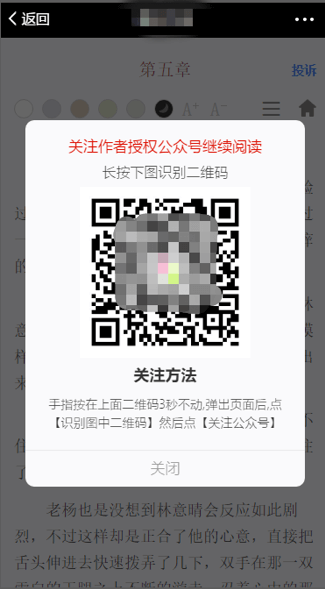
3. Inducing or misleading users to download or go to a external landing page
3.1 The monetary rewards, physical prizes, virtual prizes (including but not limited to red envelopes, coupons, vouchers, points, credits, traffic, information), etc., expressed or implied by the contents of the external Link, cannot be obtained by users within WeChat. Users need to download or switch to an external app, or leave WeChat, download specific content or complete a specific operation to get the prize.
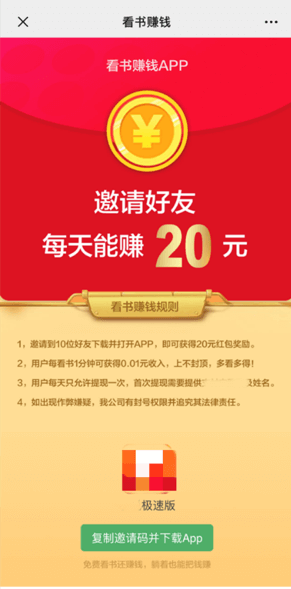
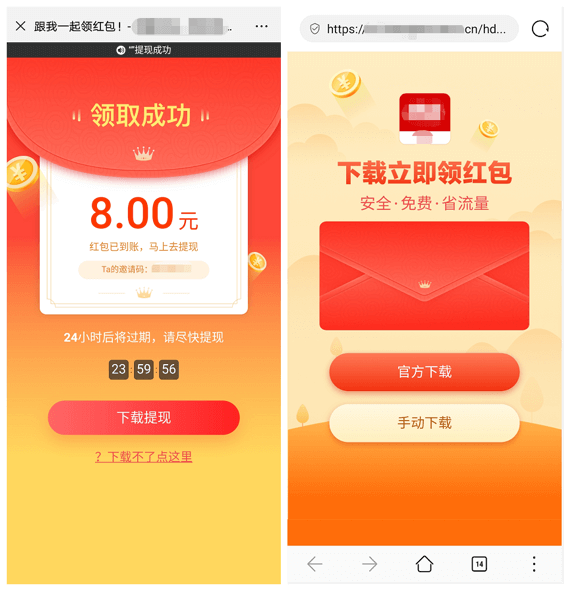
3.2 The title, content, button description, text description of the external link, do not match the actual implementation effect, causing the user to misunderstand or misleading the user to click, download or jump to the external APP. For example, titles such as “Click to read the full content”, “Click to continue listening”, “Click to receive Red Envelope”, which actually leads to an external APP or an external downloading page.
4. Violation of group purchase specifications
4.1 Fake group purchase events, such as all or part of the group participants do not have to pay, or the amount paid by some group participants is obviously not equivalent to other participants.
4.2 Fraudulent group purchase, such as the value of the physical or virtual items obtained by all or part of the group participants is significantly lower than the price paid by the users.
4.3 Group purchase events with lottery nature, such as the quantity or quality or value of the physical or virtual items obtained between the participants of the group, are obviously not equivalent.
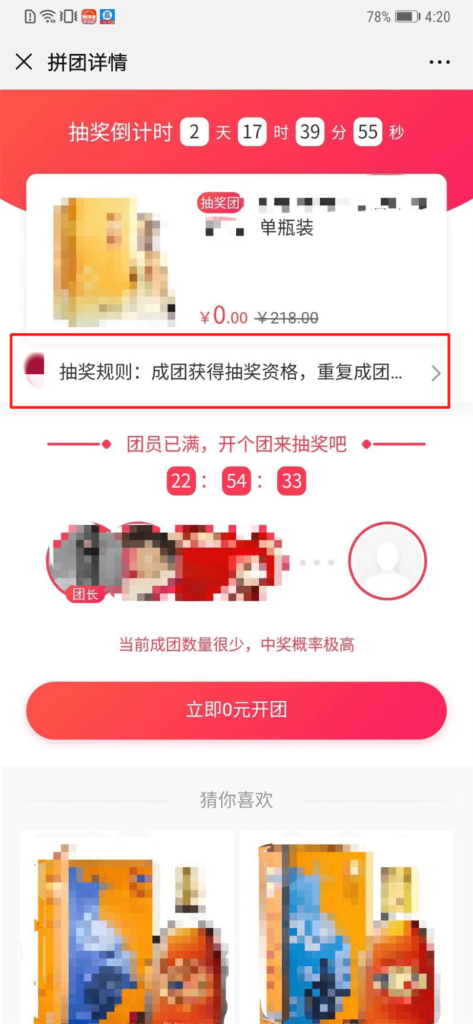
4.4 Group purchase events with no clear and definite rules, or the rules are not publicized to the users in a significant way and may mislead users into participating in the group purchase events or making payments. For example, rules like if the user fails to create a purchasing group with certain amount of members, the deposit shall not be returned, which hasn’t been displayed properly.
4.5 Any group purchase content with external link that spreading on WeChat Moment
5. H5 games and testing quiz
Any activities in the form of H5 games, testing quiz to attract users to participate, including but not limited to hand-speed competition, Q&A, personality test, draw lots, web game.
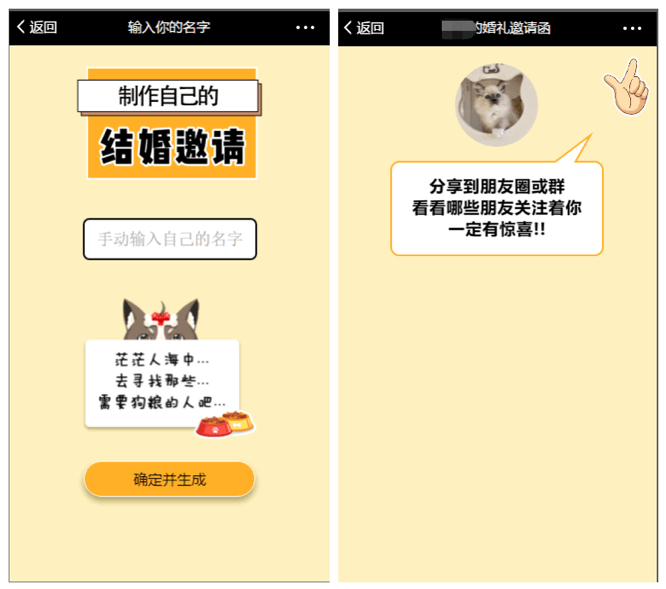
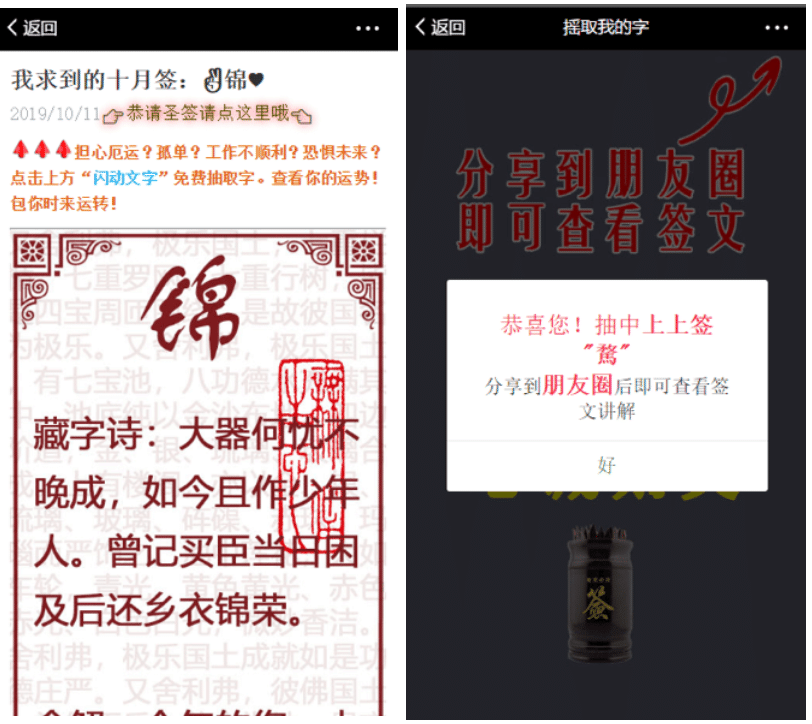
6. Fraudulent content
6.1 Fake red envelopes, activities
Deceive users earning money, physical prizes, virtual prizes by promising fake red envelopes, activities etc., including but not limited to fake cash red packets, phone bills, traffic red packets, coupons, special offers, etc.
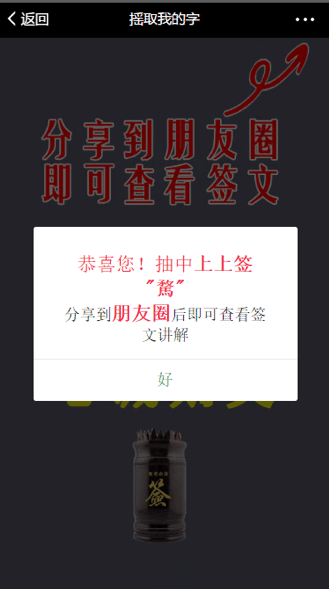
6.2 Promote or sell products & services that infringe the legitimate rights and interests of others. For example, free gifting events that ask users to pay shipping fee in order to make money, scam in the name of pay services etc.
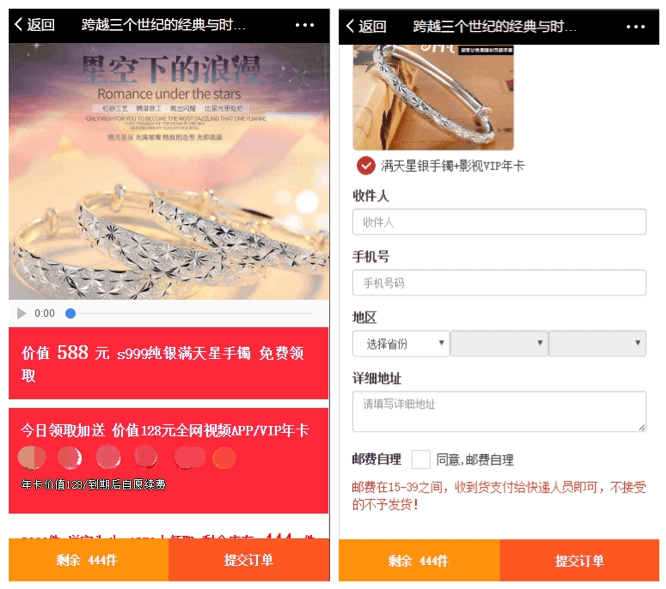
6.3 Counterfeit other WeChat Official Account’s article design, domain name
Counterfeiting other WeChat Official Account’s article design, and domain which might confuse users.
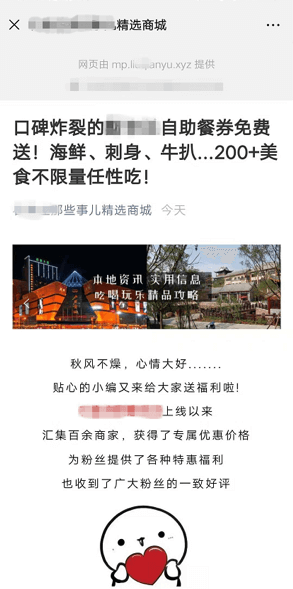
7. Illegal operations and suspicious services
7.1 Illegal distribution
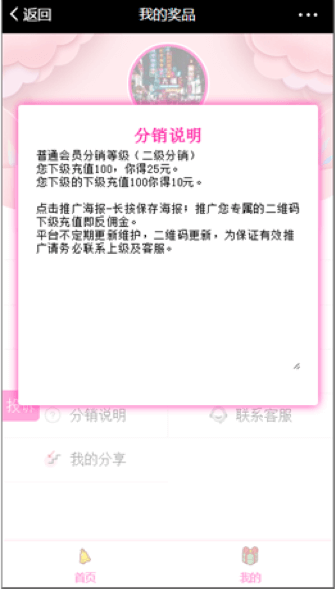
7.2 Publishing, promoting or engaging in relevant business activities without obtaining a statutory license, obtaining the approval from the relevant governmental supervising department, meeting the requirements of the regulatory authorities, including but not limited to illegally publishing promotion content for medical drugs and medical devices, illegally publishing tobacco-related promotion content, and illegally publishing promotion content for investment consulting service (such as securities or futures).
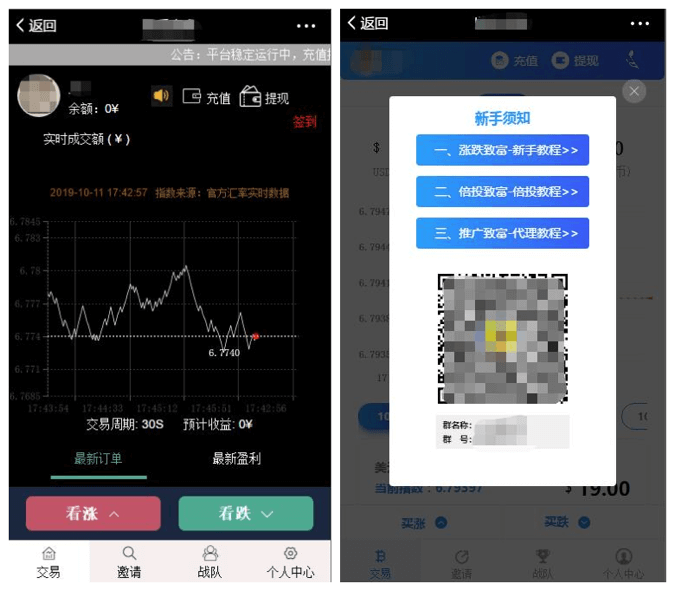
7.3 Participate, encourage, promote or induce others against normal commercial competition in any form, or facilitate the fore-mentioned behaviors.
7.4 Providing services to automatically hide, disguise, change user’s true identity or induce users to hide, disguise, change their true identity.
7.5 Other illegal business operations and suspicious services
8. Rumors
Publishing fake information, creating rumors which might cause damage to other individuals, businesses or other institutions, such as tap water obtains poison, banana cause cancer, crayfish is bad for health, etc.
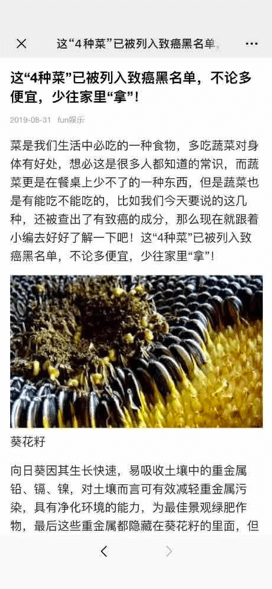
9. Harassment, false advertisements and spam
Spreading harassment, fraud, spam content, including but not limited to fake prize winning information, health products, drugs, food information that do not comply with relevant national laws and regulations, fake and shoddy goods information, fake service information, fake internet currency, and the content and links that might lead to bad user experience if too many users sharing it in a short time.
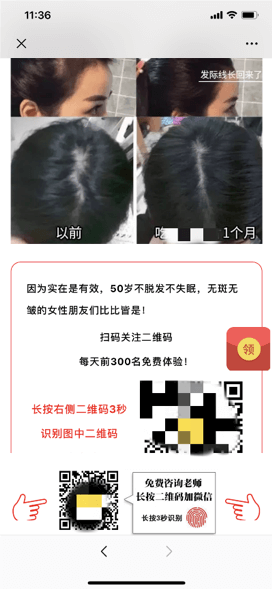
10. Content that does not match the title, content with vulgar information
10.1 Content that does not match the title
Deliberately make an eye-catching headline which is misleading, provocative or with obvious bias
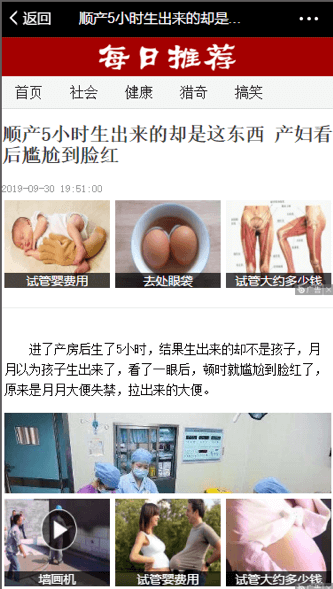
10.2 Vulgar information
Contents involving sexual organs, sexual behaviors, sexual cues, spreading low-level fun, vulgar, indecent content, or promoting violence, malicious slanders, insulting others, such as spreading content with sneak shots, one-night stands, wife-changing, sexual abuse, erotic animation, illegal sexual drug advertisements and sexual diseases treatment advertisements, promotion of pornographic websites, etc.
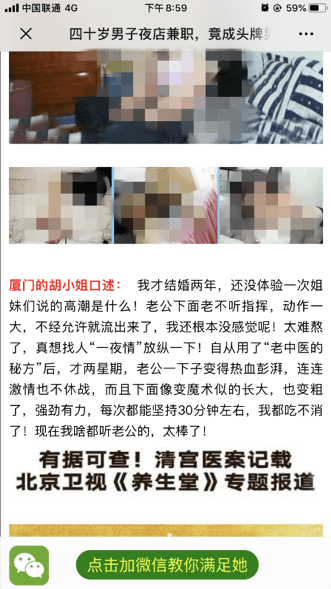
11. Illegally collect user data
11.1 Copying, storing, using or transmitting user data without users’ explicit consent and without explain the use of the data to users etc., including but not limited to requiring users to share personal information (mobile phone number, date of birth, etc.) in order to continue using the service/function, or collect password or personal information (including but not limited to mobile phone number, ID number, birthday, address, etc.).
11.2 Abuse user data (including but not limited to avatars, nicknames, etc.) without the users’ explicit consent and without explain the use of the data and the scope of the use to users etc. For example, using users’profile picture, nicknames to inform, guide, induce other users to click, open, download or share the app or link.
11.3 Collecting user data from WeChat and other platforms without the written permission of Tencent, which Tencent believes to be sensitive (including but not limited to WeChat account, WeChat password, QQ number, QQ password, user relationship tree, buddy list data, bank account number and password, etc.). The legally obtained data is also not allowed to be used for developing and maintaining its own network or client’s network.
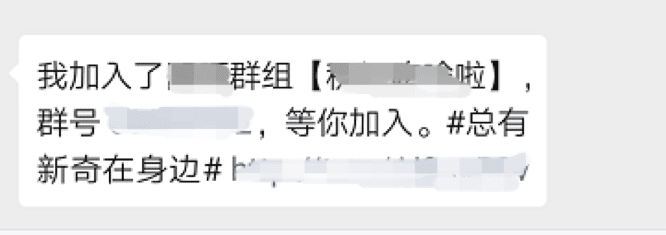
11.4 Except for marking the user’s identity, it is forbidden to reuse the users’ information (including but not limited to avatars, nicknames, etc.) obtained through authorization for other purposes.
11.5 As the floating layers of the external link may lead to information leakage (like users’nickname, avatars), it is forbidden to include users’ privacy data into the floating layer and using partial or full occlusion to guide or mislead users to download or follow the official account.
12. Infringement on the rights of others
Publishing content that infringes the legal rights of others, such as reputation, portrait rights, intellectual property rights, trade secrets, etc.
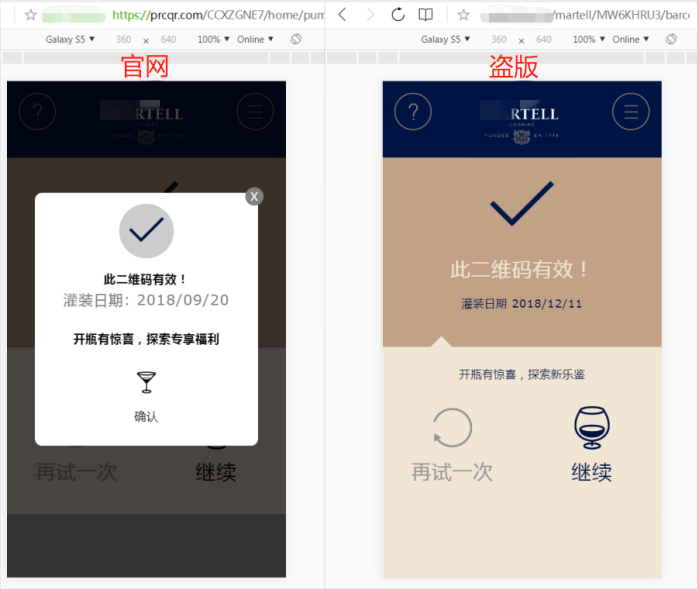
13. “Religious donations” and related information
Any dissemination of “religious donations” that may cause damage to the legitimate rights and interests of WeChat users, such as “donate for the Buddha online”, “Set lives free online” etc.
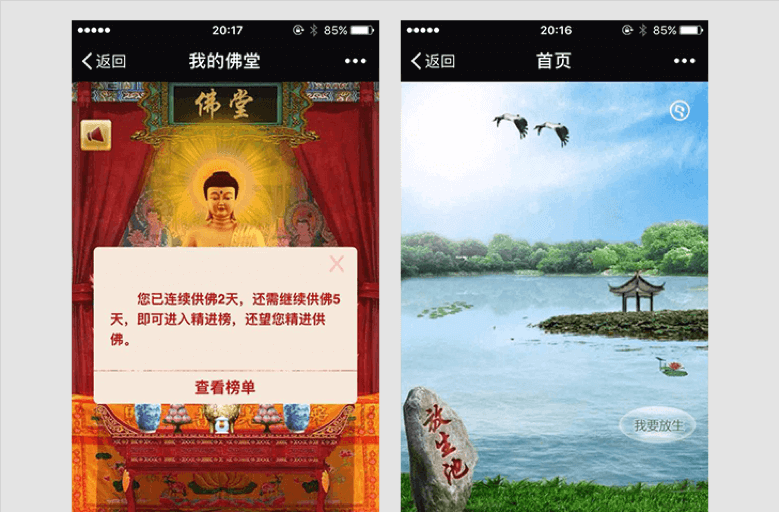
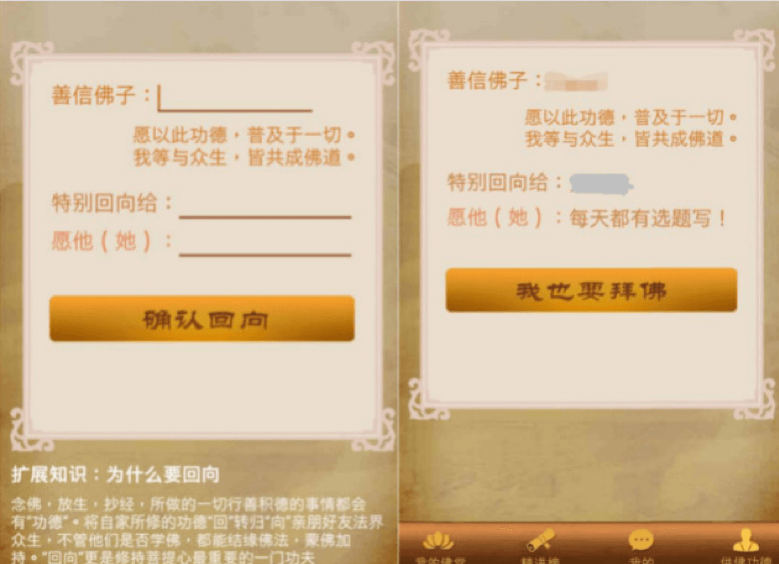
14. Pay to vote
Any events that require users to make a payment in order to vote for a candidate, including but not limited to make a direct online payment to the candidate to vote, make a payment to send virtual gifts, physical gifts, credits, coupon, vouchers to the candidate to vote etc.
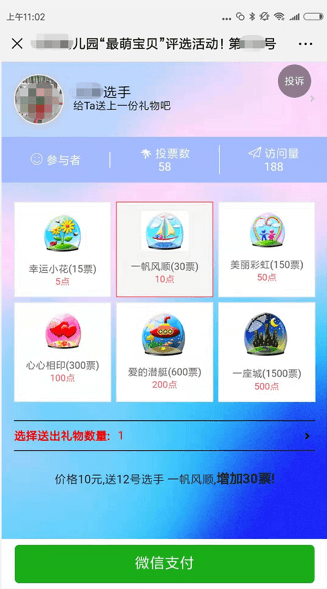
15. Force users to a landing page
Any content that forces the user to a landing page, including but not limited to hijack users to a different page when click the button “return”.
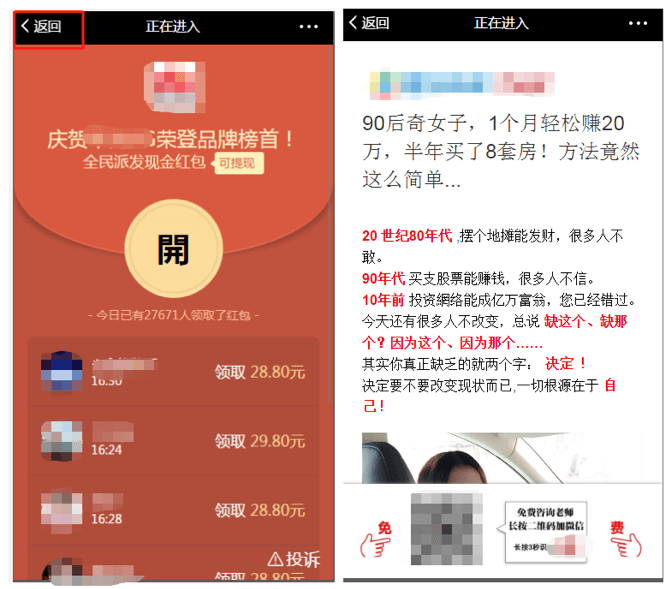
16. Service, platform with the similar function as WeChat and its eco-system
16.1 Service, platform which is similar or identical to WeChat and its eco-system , or capable of achieving the primary function of WeChat and its eco-system.
16.2 The page design, function, description or user experience of the service, platform is similar to WeChat and its eco-system, which might misleads WeChat users to assume that the service is provided by Tencent or authorized by WeChat.
17. Special identification code, passcode
The external link shall not contain any special identification code or passcode generated by third-party software, web pages or terminals which can be used to identify and mark WeChat users. For example, code that might lead to harassment and inducement, codes that contains illegally collected personal user data etc.
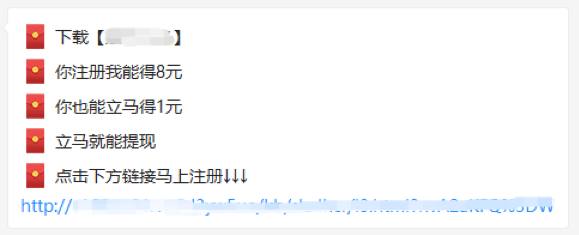
18. Other content that violates national laws and regulations, including but not limited to:
(1) Violation of the basic principles established by the Constitution.
(2) Endangering national security, revealing state secrets, subverting state power, and undermining national unity.
(3) Damage to national honors and interests.
(4) Inciting ethnic hatred, ethnic discrimination, and undermining national unity.
(5) Destroying national religious policy and promoting cults and feudal superstitions.
(6) Spreading rumors, disrupting social order and undermining social stability.
(7) Spreading obscenity, pornography, gambling, violence, terrorism or abetting users to conduct a crime
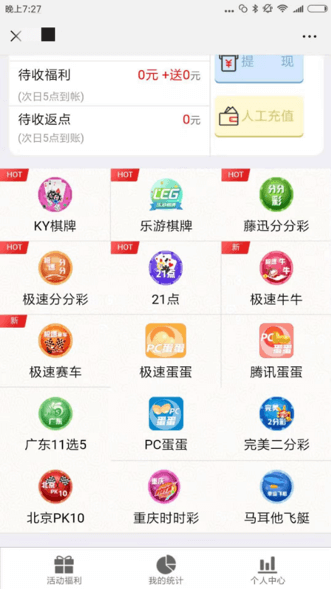
(8) Insulting or slandering others and infringing the lawful rights and interests of others.
(9) Inciting illegal gatherings, associations, parades, demonstrations to disturb social order.
(10) Activities in the name of the illegal organizations.
(11) Containing other content prohibited by laws and administrative regulations.
19. Malicious violations and confrontational behaviors
Malicious violations and confrontational behaviors refer to deliberately and objectively violating of the “WeChat public platform operation norms” and “WeChat external link management norms”, including but not limited to the following forms:
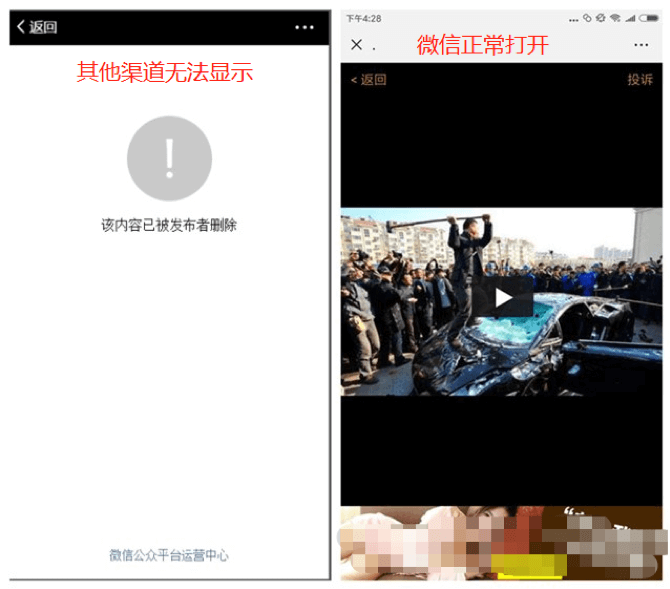
19.1 Repeated violations: similar or other forms of violations continue to exist after the violation is processed.
19.2 Counter-platform measures: Conduct technical confrontation, circumvent, find or use bug to implement or assist in the implementation of the illegal behaviors against security policies of WeChat external link management, alone or in conjunction with others.
19.3 Restrict page browsing channels without proper reasons resulting in a substantial inconsistency between the WeChat display effect and other browser display effects. For example, the page is set to be only allowed to be displayed on WeChat, or not fully displayed on WeChat without proper reasons.
19.4 Take other countermeasures, including but not limited to setting fake or counterfeit Tencent official complaint feedback portal and related function pages, malicious blocking of webpage sharing and other original page functions, and nesting multilevel switching webpages to defraud of clicks and access.
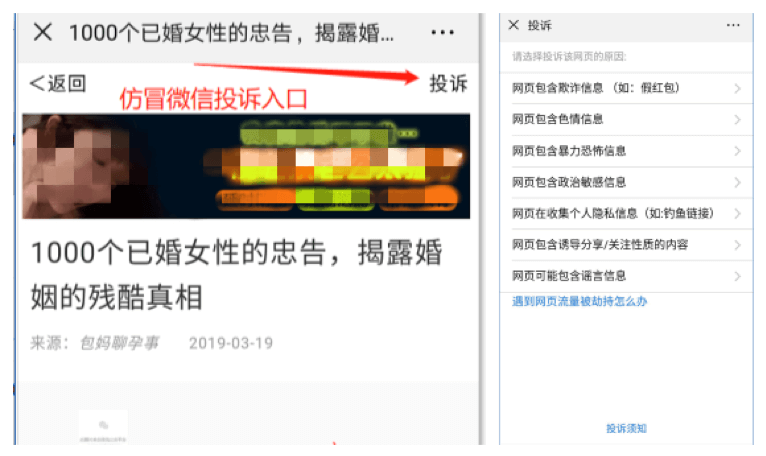
20. Ladder of penalty rules
First time violation of the external link can apply for unblocking after being modified. The application method is to click “Request to resume access” on the page and submit relevant information to initiate the application.
For repeated, serious or multiple violations, the platform will adopt different levels of punishment according to the specific circumstances and have the right to set an observation period after the rectification application is passed, and the access will be restored when the observation period is ended.
Acts of malicious confrontation after violations (including but not limited to the use of multiple domain names, multiple accounts, etc., to circumvent, limit, and disrupt platform management measures) are handled in accordance with Article 19 “Malicious Violations and Confrontation Behaviors”.
In order to ensure the effective implementation of platform management measures, avoid using the registration of different accounts, setting up or using different entities for registration, etc., to circumvent, avoid or counter the management of the platform, for the same entity, or the entity of its associated relationship (including but not limited to the existence of parent-subsidiary, head and branch office, direct or indirect holding relationship, the actual controller, directors, supervisors, senior management and the entity have direct or indirect control relationship, the agreement control of the VIE structure, or the disclosure from the securities market and its official propaganda can confirm the existence of relationships, etc.) , Tencent has the right to no longer provide appeal channels and refuse to re-apply for such entities, if there is single or multiple violations of laws, regulations, or agreements about the service.
Appeals and FAQs: http://kf.qq.com/faq/170118UnqeUZ170118mUb6fu.html

